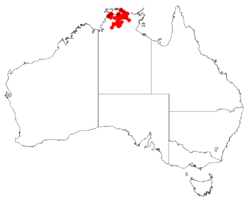Biology:Acacia mimula
| Acacia mimula | |
|---|---|
LC (TPWCA)[1]
| |
| Scientific classification | |
| Kingdom: | Plantae |
| Clade: | Tracheophytes |
| Clade: | Angiosperms |
| Clade: | Eudicots |
| Clade: | Rosids |
| Order: | Fabales |
| Family: | Fabaceae |
| Subfamily: | Caesalpinioideae |
| Clade: | Mimosoid clade |
| Genus: | Acacia |
| Species: | A. mimula
|
| Binomial name | |
| Acacia mimula | |

| |
| Occurrence data from AVH | |
Acacia mimula is a tree in the genus Acacia. It is native to the Northern Territory, and found in open forest, from the Darwin region to western Arnhem Land.[1]
Description
Acacia mimula is a tree which grows up to 7 m high. Its bark is dark grey and has horizontal fissures. Its branchlets are flattened and smooth, and its stipules fall. The pulvinus is 3-4 mm long and minutely hairy. The phyllodes are elliptic, smooth, and curved, and are 70-180 mm long by 7-35 mm wide, with two to three primary veins. The secondary veins are oblique or penniveined or form a network. The base of the phyllode is attenuate, while the apex is obtuse. There are four to five glands along the dorsal margin. The axillary inflorescences are racemes or panicles, with 9-24 heads per raceme, on an axis 65-150 mm long. The white/cream heads are globular and 6-9 mm wide on smooth peduncles which are 6-14 mm long. The linear or oblong, slightly curved pods are greyish and 75-130 mm long by 20-28 mm wide. The broadly ellipsoid, brown seeds are transverse in the pod and 10 mm long by 7-9 mm wide. It flowers from April to June and fruits from August to September.[1]
It can be confused with A. latescens.[1]
See also
References
- ↑ 1.0 1.1 1.2 1.3 "Northern Territory Flora online: Acacia mimula Pedley". Northern Territory Government. 2013. http://eflora.nt.gov.au/factsheet?id=3494.
- ↑ "Acacia mimula". Australian Plant Name Index (APNI), IBIS database. Centre for Plant Biodiversity Research, Australian Government. https://biodiversity.org.au/nsl/services/rest/name/apni/66835.
- ↑ Pedley, L. (1977). "Notes on Leguminosae. I". Austrobaileya 1 (1): 25–42. pdf
Wikidata ☰ Q15287793 entry
 |

